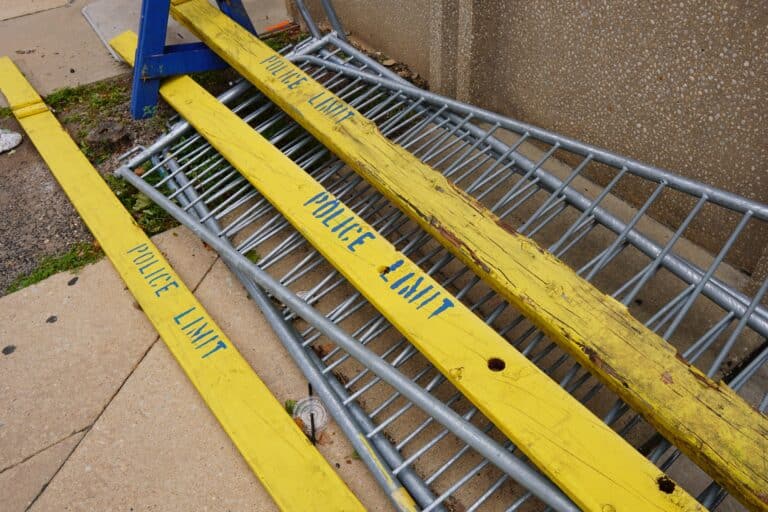New updates in the aftermath of last week’s Lewiston mass shooting continue to suggest that law enforcement officials failed to disarm the gunman despite having ample opportunity and legal justification to do so.
In the days following the attack, which left 18 people dead and 13 others wounded, details surrounding the perpetrator’s mental health history remained hazy. An official law enforcement bulletin published during the manhunt for the shooter, and later reporting by the Associated Press, indicated that his time spent in a mental hospital was the result of an involuntary commitment. That would make it a federal crime for him to possess firearms. However, information shared by Maine officials just days later seemed to dispute that point.
“I have not seen to this point that [the shooter] was forcibly committed for treatment,” Mike Sauschuck, Maine Public Safety Commissioner, said in a press conference last weekend. “And if that didn’t happen, then the NICS check, you could go into a firearms dealer who does all of their work, and the background check is not going to ping that this person was prohibited.”
But on Wednesday, The Boston Globe reported that an official with the hospital where the shooter underwent mental health treatment confirmed that his stay was indeed the result of involuntary commitment.
“Another warning came in July when [the suspect] grew agitated, paranoid, and delusional while his unit was stationed at West Point Academy in Cortlandt to train young soldiers,” The Globe reported. “The situation deteriorated to the point where New York State Police were called in to escort [the suspect] to the hospital, where he was involuntarily committed. Physicians there determined he needed further treatment and sent him to another hospital, where he stayed for two weeks.”
The Globe also noted that the commitment prompted the Army to instruct the shooter’s commanders to no longer allow him to “have a weapon, handle ammunition, or participate in live-fire activity while on duty.”
The paper‘s reporting provides the most significant indication yet that the shooter should never have been allowed to buy or keep the guns he used to carry out his attack. It also raises questions as to why, for the purposes of the federal background check system, his time spent under involuntary commitment was not on the federal government’s radar.
If what the hospital official confirmed is true, then under the letter of the law the shooter was a prohibited person as early as July of this year—a full three months before he ever went on his deadly rampage. 18 U.S.C. § 922(g)(4) makes it a felony offense for any person who has been “adjudicated as a mental defective” or who has been “committed to a mental institution” to possess or receive a firearm. The Department of Justice considers someone to have been committed to a mental institution if that person “has been formally committed to a mental institution by a court, board, commission, or other lawful authority” on an involuntary basis.
The suspect also apparently believed he was involuntarily committed. Shortly after being released from the hospital, he attempted to buy a silencer from a Maine gun shop but failed because he indicated he had been institutionalized on his background check form.
“He came in and filled out the form, he checked off a box that incriminated himself saying that he was in an institution,” Rick LaChapelle, owner of Coastal Defense Firearms, told ABC News. “Our staff was fantastic, let him finish filling out the form, and said, ‘I’m sorry, Mr. Card, we cannot give you this… at this point in time, we cannot release this silencer to you because of the answers that you’ve given us.”
It’s not clear if the shop ran the background check after seeing the suspect admit to being committed. If it did, though, the sale may not have been blocked as it should have been because the FBI said the National Instant Criminal Background Check System didn’t have any records relating to the suspect’s time in the mental institution. The agency told the AP it “did not have nor did it receive any tips or information concerning” the suspect and it “was not provided with or in possession of any information that would have prohibited [the suspect] from a lawful firearm purchase.”
It’s possible that the Army, which was evidently so concerned with the shooter’s erratic behavior that it disarmed him while on duty, failed to report his commitment to the NICS database. That same issue was at play when the Air Force failed to share a slew of disqualifying convictions with the FBI, allowing the 2017 Sutherland Springs shooter to purchase a firearm when he would have otherwise been prohibited.
But, even if a communication breakdown between the military and federal law enforcement did occur, local officials closest to the shooter during his downward spiral also missed several opportunities to intervene. The Globe reported that multiple law enforcement officers—including the Sheriff of the county neighboring Lewiston—served in the Army reserves with the shooter and personally witnessed his threats to carry out a mass shooting that led to his involuntary commitment. Yet, no one thought to apply for a warrant to seize his already-purchased weapons based on that commitment or to try and invoke the state’s version of a “red flag” law.
Furthermore, multiple outlets have confirmed that the shooter’s erratic and threatening behavior continued after he was released from the mental facility. The Wall Street Journal reported that he again threatened to carry out a mass shooting at his Army installation and “get” the commanders who ordered his commitment in September. Those threats prompted members of his Army unit to request a wellness check from local police agencies who tried twice but never actually made contact with the shooter to confirm his mental state or evaluate his propensity for violence. The local Sheriff’s office was concerned enough to issue a missing person’s bulletin to law enforcement agencies across Maine notifying them that he was “armed and dangerous, suffering from psychotic episodes and hearing voices,” yet not so concerned as to use Maine’s temporary weapons confiscation law.
The same can be said for the New York State Police officers who were called to escort the shooter to his involuntary commitment by the Army back in July. Despite being under an executive order from New York Governor Kathy Hochul (D.) to issue a “red flag” order on anyone they have probable cause to suspect could be a threat, there’s no indication that one was filed in New York either.
There were a litany of warning signs and potential offramps on the Maine mass shooter’s road to eventual violence. While many people in his life raised alarms along the way, government officials appear to have failed to take full advantage of existing laws designed to cover individuals in this exact circumstance.






